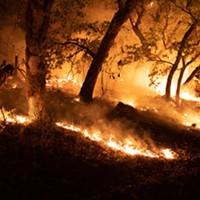[
{
"name": "Top Stories Video Pair",
"insertPoint": "7",
"component": "17087298",
"parentWrapperClass": "fdn-ads-inline-content-block",
"requiredCountToDisplay": "1"
}
]
At the Aug. 27 meeting of the Humboldt County Board of Supervisors, First District Supervisor Rex Bohn introduced a measure calling for the creation of a citizen advisory council on climate action. Such a council, it is hoped, can provide a significant additional voice to a process — the creation of a climate action plan (CAP) for Humboldt County — that local governments have been developing for several months. Bohn invited my wife Jane Lapiner and I to help present the new concept to the board and potentially field some of the questions that might arise.
We, in turn, asked Walter Smith from Willits to participate. Walter, who has been a forest certifier worldwide for the Rainforest Alliance, recently played a role in a successful effort to initiate a similar climate advisory council in Mendocino County. It should be noted that despite its progress in establishing a citizen advisory committee, Mendocino County has not yet organized its planning process into a Climate Action Plan to the degree that Humboldt has. Since the creation of such a plan is now a state mandate for all counties, Mendocino will soon catch up.
Jane and I have been addressing climate change issues in various ways for the past 20 years, including the creation of several pieces of comic theater that have been performed nationally and internationally. I have helped initiate projects to restore salmon runs in the Mattole watershed and have served as president of the board of the Institute for Sustainable Forestry.
In all but one of the last 10 years, Jane and I have also traveled to the annual U.N. Framework Convention on Climate Change, an event attended by representatives from 197 countries. Usually 20,000 or more people show up: heads of state, diplomats, climate activists, nonprofiteers, more than 2,000 members of the press and a variety of conference devotees, including astrophysicists, carbon accountants and oil industry rationalists.
One fascinating aspect of these trips was that we often found ourselves not only in strange lands but in highly unfamiliar circumstances; that is, in large crowds of people who hadn't the slightest doubt as to the reality of climate change or its human origins. It was oddly disorienting — like the springiness astronauts must feel when they first leave the reach of the Earth's gravity.
Back home, this was rarely the case. Misinformation and overt silence in the press and often scathing denial among even many neighbors and friends came to seem close to the rule. Even as evidence of climate catastrophe had risen toward the irrefutable, complacency and inobservance were more the norm than deep concern.
This was a source of great frustration for us because we had learned conclusively from the world outside of Humboldt and the U.S. that climate catastrophe had already made significant headway against the planetary stability civilization rests upon. We have met people who have themselves already suffered grave losses — of loved ones, homes, well-being — and experienced desperation as life started to disintegrate around them in the face of the onslaught of surging climatic pressures. They know first-hand and with great force what we here seem as of yet hardly aware of at all.
Awareness of change, though, has finally, undeniably come. It is interesting to surmise what brought about the transformation here and when, but regardless, a significant portion of the populace of Humboldt County has, like much of the rest of the world, finally come to believe in human-induced climate change and even begun to take steps to respond in positive, life-affirming ways.
There are many still dangerous backwaters and eddies of denial that lurk just out of sight. There are still many who have not yet fully accepted even the bare-bones laws of physics, or who hold out too much hope that new technologies will apply the same laws to somehow save us.
Maybe they're the lucky ones, those non-believers who are able to sleep, perhaps undisturbed by the fear invoked by impending disaster. The combination, though, of undeniable climatic change — droughts, intense storms, floods and heat spells of a new, greater magnitude, food shortages, and now, Amazonian conflagration — can force us out of our complacency and make crusaders of even the most cynical among us.
Maybe that's what we're factually facing — a crusade, a search for the holy grail of survival, and maybe, just maybe, it will be a search that promises to take us a few steps backward toward the resurrection of a modest abundance and a spiritual simplicity that we were once able to take for granted. Maybe as one element of our search for climate solutions we can win back or restore in some part the health and productivity of our landscapes, our cities and the natural systems around them — our oceans, streams and grasslands, our great forests and wetlands that collectively hold out the best hope of living in a healthy carbon balance.
We have already made a strong start on the trail back. Over the past 40 years, many of Humboldt's first-rate natural scientists and teams of skilled restoration workers have initiated widespread efforts to understand and renew the health of the wild lands and water courses that make up almost 90 percent of our land base.
We have also assigned a number of highly competent administrators and engaged many agencies, countywide, regionally and throughout the state. We have begun to create the mechanisms and managerial skills necessary to deal with threats and opportunities as they emerge. Perhaps most importantly, we are beginning to reduce our energy needs and replace significantly the dirty energy sources of the past with the truly renewable, and we are hoping this can be accomplished on a level that does not drive us inadvertently into the hands of mercenary powers from far outside our communities.
Hopefully we will soon have a committee of advisors in place — a cross-section of Humboldt citizens — that will allow us to better engage and apply the genius of our communities. The committee can help government implement prompt local and regional action to reduce emissions and store carbon.
The effective word here might be "prompt"— not hasty, but with a sense of some urgency. The decades of inaction based in denial are having tragic consequences, mostly in other places in the world. But our turn could come at any moment. There is no more time to waste. Collaboration between citizen groups and agency-run initiatives might hold out the highest promise for fighting the climate disaster that we have.
The ability to move ahead in a timely fashion became the major subject of discussion among the supervisors Aug. 27 after Bohn submitted his proposal. Third District Supervisor Mike Wilson expressed concern that we should not waste time by duplicating existing processes. There were similar concerns expressed about creating an ambiance in which conflicts over climate denial might again erupt and slow progress.
Fifth District Supervisor Steven Madrone put the matter in a different light. Rather than struggling with people who deny the realities of climate change, he thought we should proactively seek participation from those who accept the science and the need for prompt action. A citizens' committee composed in this manner could play a crucial role in helping to implement the actions suggested in the draft that the planning team will produce.
The process of completing this draft of the Humboldt Community Action Plan already involves seven city governments and the Redwood Coast Energy Authority, as well as the county itself. Now that process and the tasks it delineates will be joined by a team of talented citizens working toward our collective survival.
The supervisors concluded their discussion by voting unanimously to instruct county planning staff to incorporate the new Humboldt Climate Action Advisory Committee into the process after an original draft of the climate action plan has been completed.
David Simpson is a co-founder of the Mattole Salmon Group and currently sits on its board of directors. He lives near Petrolia in the Mattole Valley and prefers he/him pronouns.
Speaking of...
Comments (2)
Showing 1-2 of 2
Latest in Views
Readers also liked…
-
Hope
- Sep 7, 2023
-
California Says No to Privatizing Medicare
- Sep 21, 2023



































